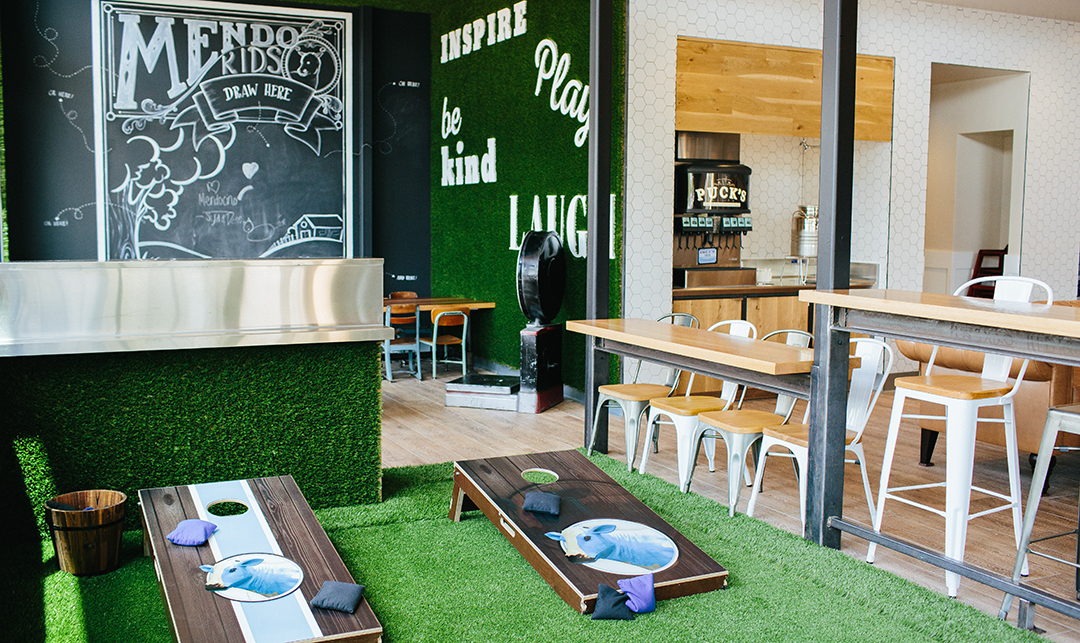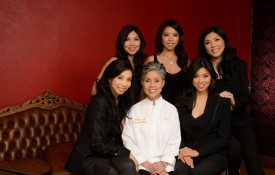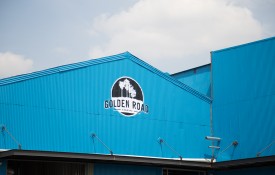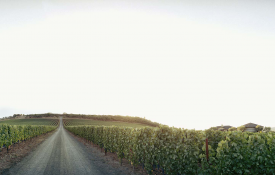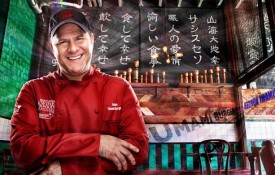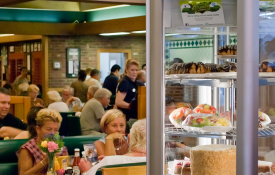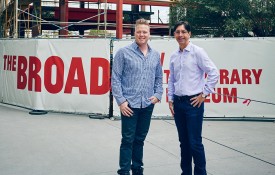Sandwiches are second nature in America; what’s the big deal, right? Yet when Mario Del Pero and Ellen Chen tell the story of how they conceived of and executed the Mendocino Farms model, it’s a salivating experience. Mario and Ellen, business partners who eventually became husband-and-wife co-founders, are staunch believers in the fact that they are “selling happy.” The sandwiches are just part of the deal.
Founded in 2005, Mendocino Farms has grown from its flagship location (at the base of a Downtown LA skyscraper in a space so desolate that even Starbucks moved out)—into one of Southern California’s most successful restaurant chains. Their 11 locations generate some of the highest sales-per-square-foot numbers in the fast-casual domain.
Chen first met Del Pero through friends in 2001 when he was running two brick-and-mortar locations for Skews, his fast-casual “skewer” concept restaurant. Chen, a technology and IT consultant in the corporate world, most recently at Electronic Arts, saw the opportunity to parlay her lifelong passion for food into a new career.
Before partnering with Ellen, Del Pero explains, he merely “owned restaurants.” After her arrival, however, he made the distinction that he “was finally in the restaurant business,” adding jokingly that she “instantly made me the number two.”
Lessons learned from the Skews experience helped the pair in their efforts to launch a new venture. Identifying key missteps, such as scarcity of parking, they made sure to adequately address those aspects. Today you will find ample parking at every Mendocino Farms location.
After 14 years as business partners, Ellen answers readily when identifying the strengths that each brings to the table. “The way we complement each other is different,” she says, adding that Mario is “a visionary from an R&D food and operations perspective.” Ellen’s role? “Infrastructure and building out the process—that’s me,” she cheerily confirms.

A savory steak BLT
As they were refining their concept for a new venture, Del Pero and Chen identified a niche that was ripe for disruption—their take on the concept of “better coffee,” which Coffee Bean & Tea Leaf and Starbucks had introduced more than 40 years ago. Rather than compete with coffee, however, they saw an opportunity in the restaurant industry’s largest sector, the sandwich space. As they saw it, there was the $6 sandwich (Subway, Quiznos), the $7 to $8 sandwich (Jimmy John’s, Which Wich), and, finally, the $12 to $13 sandwich (Joan’s on Third, Huckleberry Cafe). The terrain between $8 and $12 was relatively barren.
“We thought, ‘Hey if we can take the elements we know from production—how to make it quickly but use the quality of ingredients we were seeing at those $12 locations—we could be this $10 space where the $6 or $7 people would respect the quality and trade up while the people at $12 would likely pay $10 for the same—if not better—quality and ingredients,” Del Pero explains.
Ten years and 11 storefronts later, the basic math has produced exponential results, thanks in part to a little help from their friends. Tom Simms, the founder of Mimi’s Cafe, offered the sandwich savants some sage advice when they had just two units at the base of skyscrapers in urban settings. Simms told Del Pero and Chen they needed to prove themselves and their concept in suburbia. Taking Simms’ advice, the pair opened a third location in Marina del Rey in 2009; it’s become their highest-grossing store to date.

Mendocino Farms, Fig @ 7th
Another industry mentor is Whole Foods founder and co-CEO John Mackey, whose belief in conscious capitalism made an indelible impact on Del Pero and Chen. “Following his guidelines, we believe deeply that our vendors are our stakeholders, [and] that having real conversations with them will create value for them that they can share with us,” Del Pero explains.
One such vendor is Drake Farms. “Dr. Dan the Goat Cheese Man,” as Mario refers to him, is actually Dan Drake, the owner of the farm. Drake, who inadvertently got into the livestock business, is actually a licensed veterinarian who rescued a herd of goats from a farm in Utah that was about to be shut down. The resulting Drake’s Farm now produces all of the goat cheese that Mendocino Farms uses.
Mendocino Farms incorporated a unique approach of sorts to sell more goat cheese in order to keep Drake Farms from closing. They created the “Save Drake Farms” salad that was simply designed to save the farm. “We don’t say we saved Drake Farms, we say our guests saved Drake Farms,” says Del Pero. “Had our guests not bought the salad, we would not have ordered more goat cheese.” Eight years later, having helped the independent Ontario, Calif. farm through the lean times, Mendocino Farms is one of Drake’s largest clients. Today, you will find Drake Farms products in Whole Foods stores as well.

The “Save Drake Farms” salad
Dr. Dan Drake himself notes that, “In a food climate where nearly every restaurant and chef wants to claim they are local and sustainably sourced, there are a large number of chefs and restaurants that drop the local to get a better buy. Mendocino Farms is the real deal,” he states.
While Chen admits practicing conscious capitalism is not a clean tax write-off or a true philanthropy, she makes the point that “for us to support local artisans and farmers that deserve it and help them be more productive, spawning small businesses, is good for everyone.”
The “Mendo” culture they have created is reinforced through a five-and-a-half-hour “coaching happy” workshop that every team member attends when they are promoted. By the time someone becomes a manager, they’ve attended the seminar multiple times and have mastered a toolbox worth of leadership and coaching skills.
“Culture is not a mission statement, it’s not a quote on the wall, it’s established anytime a lead [anyone with authority] talks to another team member,” he explains. “That conversation defines our culture.”
As the quality of the food and service continue to hit high marks, Del Pero hints at further growth in Southern California, specifically La Jolla, as well as the idea of a Mendocino Food Truck. No matter where you happen to find yourself, one thing will remain certain: When you stop into a Mendocino Farms, you’ll pay for your meal, but “happy” is on the house.

Mendocino Farms, Sherman Oaks







































